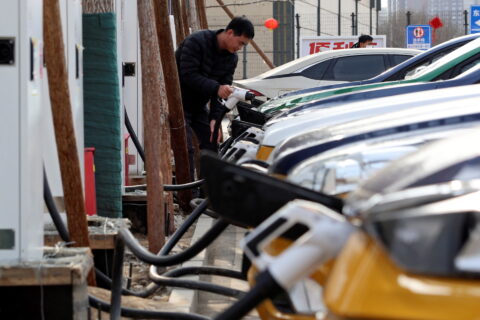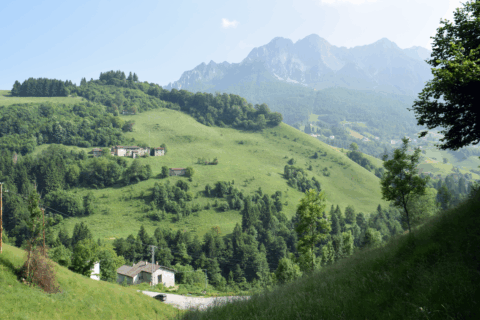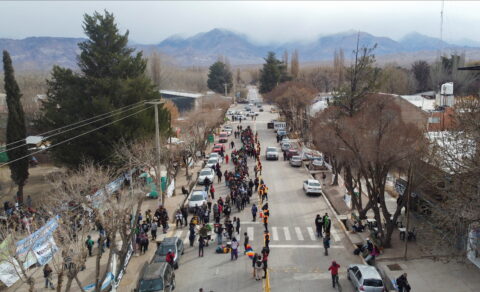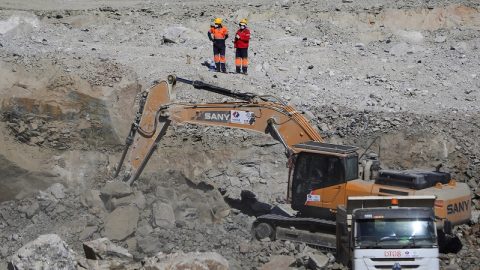Welcome to Carbon Brief’s Cropped.
We handpick and explain the most important stories at the intersection of climate, land, food and nature over the past fortnight.
This is an online version of Carbon Brief’s fortnightly Cropped email newsletter. Subscribe for free here.
Key developments
LA up in flames
ANIMAL IMPACT: At least 25 people died in blazing wildfires that tore through 40,000 acres of land in Los Angeles, NBC News reported. Vox examined how the fires “affected the animals and wildlife who call Los Angeles their home”. Videos showed people evacuating with everything from chickens to horses, Vox said, and one animal shelter took in more than 300 animals. Gavin Jones, an ecologist at the US Forest Service, told the outlet in 2023: “In this new era of rapidly changing fire regimes, we don’t have a great roadmap for how to conserve wildlife.” Al Jazeera explained that wildfires can result in “some wildlife [losing] their habitat”, which can lead to ecosystem imbalance.
AGRI AFFECTED: The fires affected farm infrastructure and animals in the surrounding region, an agricultural meteorologist told RFD TV. A citrus and avocado farm in Pauma Valley, more than two hours from Los Angeles, was impacted by the fire-fuelling Santa Ana winds. Farmer Andy Lyall told ABC News that gusts blew down fruit from his trees, ruining around half of his crops. The “strong and gusty” Santa Ana winds occur several times a year in southern California, BBC News outlined, creating “ripe conditions” for wildfires. (See Carbon Brief’s article on the role of climate change in the fires.)
PARKS AND TREES: Satellite images published in Al Jazeera showed how houses, trees and other infrastructure were scorched in the fires. The Palisades fire – the largest of the fires – “destroyed” historic buildings and other infrastructure at two major parks, according to a statement from California State Parks. Meanwhile, the Los Angeles Times looked at claims and counter-claims about the risk shrubs and brush posed to the spread of the wildfires. Chief Brian Fennessy from the Orange County Fire Authority told the newspaper that clearing brush is “very effective” at limiting fire spread on a normal day, but not against the strength of these fires and winds.
Brazil: COP30, Amazon shipping and soy moratorium
ROCKY WATERS: Brazil’s government cancelled a bid for a “dredging project” to aid the docking of cruise ships in Belém when it hosts COP30 later this year, according to Folha de São Paulo. The dredging, which would remove sediment from the bottom of the port, was expected to impact “the composition of sediments, the behaviour of aquatic mammals and the quality of the water itself”, the newspaper said. The project was aimed to increase accommodation amid a shortage of hotel rooms for the climate summit.
‘RISKY’ SHIPPING PLANS: Meanwhile, Mongabay looked at Brazil’s plans to develop new shipping channels in Amazon waterways, which experts say could “result in conversion of traditional peoples’ lands to carbon-intensive agriculture”. The outlet said the country is “poised” to invest in developing more than 2,000km of channels for agribusiness transport in “shrinking rivers”. Dr José Marengo, a climatologist and hydrology specialist, said it is “crazy” to consider creating the shipping channels in certain rivers because of the “extremely low [water] levels, mainly due to the droughts of 2023 and 2024. It’s very risky.”
SOY PACT: Elsewhere in Brazil, the supreme court will soon rule on a request challenging a state law that would end tax breaks for grain traders who avoid soy from recently deforested areas of the Amazon, Reuters reported. The legislation was passed in Mato Grosso last year, but will not take effect until a final court decision in February, the newswire said. The law added “growing pressure” to Brazil’s soy moratorium – the “voluntary pact” to ban the purchase of soy from deforested Amazon areas after 2008, Reuters noted. Last month, a farmer lobby group asked the country’s antitrust agency to investigate the signatories of this pact, describing them as a “purchasing cartel”, the newswire said.
Spotlight
Illegal rewilding in Scotland
In this Spotlight, Carbon Brief explores the curious case of the illegal reintroduction of four Eurasian lynx in the Scottish Highlands.
A few days ago, a pair of labrador-sized cats with dappled fur and tufty ears were spotted wandering free in Cairngorms national park in the Scottish Highlands.
They were quickly identified as Eurasian lynx, a species of big cat that went extinct in the UK more than 1,000 years ago. (They are still widely found across Europe and Asia).
The cats were released illegally, according to the police and the national park authority. The animals – along with a second pair caught on camera traps a day later – were captured humanely and brought to a nearby wildlife park. One has since died.
While there is a growing movement advocating for the reintroduction of lynx in order to “rewild” Scotland, none of the conservation groups involved with such calls have claimed responsibility for the release.
One charity called the move “reckless” and “highly irresponsible”, warning the cats were most likely raised in captivity and would have died after being left alone in the wild.
Despite this, there is “speculation” that the most likely culprit is “someone who had grown frustrated with the slow progress” of the campaign to reintroduce lynx to Scotland and decided to “take matters into their own hands”, according to the Guardian.
Guerrilla rewilding
The UK has a long history of illegal animal releases shaping its ecosystems.
Multiple introductions of grey squirrels since the 1890s has all but wiped out the native red across most of the country. Further illicit releases, once blamed on the US musician Jimi Hendrix, have allowed feral green parakeets to spread across London and its surrounding areas.
More recently, conservationists have warned of the growing practice of “beaver bombing”, the covert release of beavers into natural areas by advocates who think the government is not moving fast enough to reintroduce the rodents as part of rewilding efforts. (The new Labour government is reportedly blocking plans to legalise beaver releases in England.)

Both beavers and lynx are considered to be “keystone species”, meaning they can have an outsized impact on the environment surrounding them.
A group of beavers released illegally in the River Otter in Devon were given official permission to stay by the government after a five-year trial showed that their dam-building helped to alleviate flood risk and local pollution.
Climate carnivores
Advocates of reintroducing lynx to Scotland say that the predators could help to reshape the forest ecosystem surrounding them through the “ecology of fear”.
In essence, lynx litter the landscape with their faeces and urine, prompting roe deer – their main prey – to keep moving, rather than staying still and overgrazing on young vegetation before it has had a chance to establish.
Over time, this could help to create a denser forest environment, with benefits for storing carbon and boosting biodiversity, it is argued.
However, research has found that local communities in Scotland have mixed feelings about reintroducing lynx.
A study published in 2023 involving interviews with more than 40 people found that some locals were in favour of reintroducing lynx, either for economic or environmental reasons, while others were “unconvinced” of the evidence supporting the benefits or felt strongly opposed to the idea of big cats being set loose.
The farmers’ union NFU Scotland opposes the reintroduction of lynx over fears the animals could hunt and kill livestock.
News and views
BIDEN BACKTRACKS: The Biden administration “abruptly” stepped back from a plan to protect old-growth forests after “pushback from Republicans and the timber industry”, the Associated Press reported. This ended a “years-long process to…better protect old trees that are increasingly threatened by climate change”, the newswire said. Opponents argued that restricting logging in older forests was not necessary, partly because “many forested areas already are protected”, the AP said. Alex Craven from the Sierra Club conservation group said there was a “scientific necessity and public expectation” to protect these forests.
WATER WOES: Climate change is “wreaking havoc” on the Earth’s water cycle, according to the Global Water Monitor’s 2024 report, covered by the Indian Express. Last year, water-related disasters killed at least 8,700 people, displaced 40 million and resulted in economic losses exceeding $550bn globally, the newspaper said. At the same time, there were 38% more record-dry months, compared to the period 1995-2005. In 2025, droughts could intensify in northern South America, southern Africa and parts of Asia, it added.
KOALAS AT RISK: Logging in the proposed “Great Koala national park” in New South Wales, Australia, has increased since 2023, according to an analysis covered by the Guardian. In March 2023, a new Labor state government came into power, promising to protect the area. But the report, from the conservation group North East Forest Alliance, found that more than 7,000 hectares of forest has been logged in the region since then, the newspaper said. New South Wales agriculture minister Tara Moriarty said “the claims in the report are not true” and the government was “getting on with delivering a Great Koala national park while at the same time ensuring a sustainable timber industry”.
BOTSWANA ADAPTATION: Botswana has put forward a new climate plan to the UN, prioritisting adaptation measures, such as introducing drought-tolerant crops and cows, over measures to cut its already-low emissions, Climate Home News reported. Botswana’s climate plan, known as a “nationally determined contribution” (NDC), said that, “as Botswana is one of the lowest emitters in the world, the limited financial resources available will be prioritised for adaptation”. Climate Home News said that the move has been “praised by African climate negotiators as a model that low-emitting, vulnerable countries should follow”.
FUTURE CROP YIELDS: Senior officials in India believe that rice and wheat yields will drop by 6-10% in future due to climate change, the Press Trust of India reported, via the Kashmir Observer. This will “significantly impac[t] farmers and food security”, Mrutyunjay Mohapatra, the director general of the India Meteorological Department, told the newspaper. In 2023-24, India’s wheat output exceeded 113m tonnes – about 14% of the global output, the outlet noted. The country also produced more than 137m tonnes of rice.
Watch, read, listen
BACK IN TIME: The possibilities and scientific developments around species “de-extinction” were discussed in a Yale Environment 360 feature.
ON THE MOVE: An article in Vox explored how wildlife migrations are “increasingly threatened” by roads, climate-fuelled extreme weather and agricultural fields.
DAILY FIX: An editorial in the Financial Times examined how climate change is “mostly to blame” for skyrocketing coffee and chocolate prices.
‘UNIT OF NATURE’: In the first Georgina Mace Review, an annual conservation biology journal named after the late UK scientist, a group of biologists examine whether it is possible to create a standardised measure for biodiversity, otherwise known as a “unit of nature”.
New science
- A Nature study found that one-quarter of freshwater animal species are at “high risk” of extinction. The researchers assessed the global extinction risk of more than 23,000 freshwater species, finding that fauna faced several “prevalent threats”, such as pollutants, agriculture and invasive species.
- Crop and grass biomass production could decline by more than 50% by 2050 in parts of west Africa due to climate change and other factors, a study in Scientific Reports said. The results of the modelling “underscore the intricate interplay between climate, crops, livestock and emissions”, the researchers wrote.
- Forests in Borneo that had been selectively logged retained relatively high levels of biodiversity, compared to areas that had been cleared to make way for palm oil plantations, research in Science found. The findings “demonstrate the complexity of land-use impacts on ecosystems”, the study said.
In the diary
- 15-18 January: Global Forum for Food and Agriculture | Berlin
- 16 January: Vanuatu parliamentary elections
- 16-17 January: G20 first sustainable finance working group meeting | South Africa
- 20 January: US presidential inauguration day | Washington DC
- 20-24 January: World Economic Forum annual meeting | Davos, Switzerland
Cropped is researched and written by Dr Giuliana Viglione, Aruna Chandrasekhar, Daisy Dunne, Orla Dwyer and Yanine Quiroz. Please send tips and feedback to cropped@carbonbrief.org
The post Cropped 15 January 2025: LA up in flames; Illegal rewilding in Scotland; COP30 dredging cancelled appeared first on Carbon Brief.
Cropped 15 January 2025: LA up in flames; Illegal rewilding in Scotland; COP30 dredging cancelled
Climate Change
Cropped 25 February 2026: Food inflation strikes | El Niño looms | Biodiversity talks stagnate
We handpick and explain the most important stories at the intersection of climate, land, food and nature over the past fortnight.
This is an online version of Carbon Brief’s fortnightly Cropped email newsletter.
Subscribe for free here.
Key developments
Food inflation on the rise
DELUGE STRIKES FOOD: Extreme rainfall and flooding across the Mediterranean and north Africa has “battered the winter growing regions that feed Europe…threatening food price rises”, reported the Financial Times. Western France has “endured more than 36 days of continuous rain”, while farmers’ associations in Spain’s Andalusia estimate that “20% of all production has been lost”, it added. Policy expert David Barmes told the paper that the “latest storms were part of a wider pattern of climate shocks feeding into food price inflation”.
-
Sign up to Carbon Brief’s free “Cropped” email newsletter. A fortnightly digest of food, land and nature news and views. Sent to your inbox every other Wednesday.
NO BEEF: The UK’s beef farmers, meanwhile, “face a double blow” from climate change as “relentless rain forces them to keep cows indoors”, while last summer’s drought hit hay supplies, said another Financial Times article. At the same time, indoor growers in south England described a 60% increase in electricity standing charges as a “ticking timebomb” that could “force them to raise their prices or stop production, which will further fuel food price inflation”, wrote the Guardian.
‘TINDERBOX’ AND TARIFFS: A study, covered by the Guardian, warned that major extreme weather and other “shocks” could “spark social unrest and even food riots in the UK”. Experts cited “chronic” vulnerabilities, including climate change, low incomes, poor farming policy and “fragile” supply chains that have made the UK’s food system a “tinderbox”. A New York Times explainer noted that while trade could once guard against food supply shocks, barriers such as tariffs and export controls – which are being “increasingly” used by politicians – “can shut off that safety valve”.
El Niño looms
NEW ENSO INDEX: Researchers have developed a new index for calculating El Niño, the large-scale climate pattern that influences global weather and causes “billions in damages by bringing floods to some regions and drought to others”, reported CNN. It added that climate change is making it more difficult for scientists to observe El Niño patterns by warming up the entire ocean. The outlet said that with the new metric, “scientists can now see it earlier and our long-range weather forecasts will be improved for it.”
WARMING WARNING: Meanwhile, the US Climate Prediction Center announced that there is a 60% chance of the current La Niña conditions shifting towards a neutral state over the next few months, with an El Niño likely to follow in late spring, according to Reuters. The Vibes, a Malaysian news outlet, quoted a climate scientist saying: “If the El Niño does materialise, it could possibly push 2026 or 2027 as the warmest year on record, replacing 2024.”
CROP IMPACTS: Reuters noted that neutral conditions lead to “more stable weather and potentially better crop yields”. However, the newswire added, an El Niño state would mean “worsening drought conditions and issues for the next growing season” to Australia. El Niño also “typically brings a poor south-west monsoon to India, including droughts”, reported the Hindu’s Business Line. A 2024 guest post for Carbon Brief explained that El Niño is linked to crop failure in south-eastern Africa and south-east Asia.
News and views
- DAM-AG-ES: Several South Korean farmers filed a lawsuit against the country’s state-owned utility company, “seek[ing] financial compensation for climate-related agricultural damages”, reported United Press International. Meanwhile, a national climate change assessment for the Philippines found that the country “lost up to $219bn in agricultural damages from typhoons, floods and droughts” over 2000-10, according to Eco-Business.
- SCORCHED GRASS: South Africa’s Western Cape province is experiencing “one of the worst droughts in living memory”, which is “scorching grass and killing livestock”, said Reuters. The newswire wrote: “In 2015, a drought almost dried up the taps in the city; farmers say this one has been even more brutal than a decade ago.”
- NOUVELLE VEG: New guidelines published under France’s national food, nutrition and climate strategy “urged” citizens to “limit” their meat consumption, reported Euronews. The delayed strategy comes a month after the US government “upended decades of recommendations by touting consumption of red meat and full-fat dairy”, it noted.
- COURTING DISASTER: India’s top green court accepted the findings of a committee that “found no flaws” in greenlighting the Great Nicobar project that “will lead to the felling of a million trees” and translocating corals, reported Mongabay. The court found “no good ground to interfere”, despite “threats to a globally unique biodiversity hotspot” and Indigenous tribes at risk of displacement by the project, wrote Frontline.
- FISH FALLING: A new study found that fish biomass is “falling by 7.2% from as little as 0.1C of warming per decade”, noted the Guardian. While experts also pointed to the role of overfishing in marine life loss, marine ecologist and study lead author Dr Shahar Chaikin told the outlet: “Our research proves exactly what that biological cost [of warming] looks like underwater.”
- TOO HOT FOR COFFEE: According to new analysis by Climate Central, countries where coffee beans are grown “are becoming too hot to cultivate them”, reported the Guardian. The world’s top five coffee-growing countries faced “57 additional days of coffee-harming heat” annually because of climate change, it added.
Spotlight
Nature talks inch forward
This week, Carbon Brief covers the latest round of negotiations under the UN Convention on Biological Diversity (CBD), which occurred in Rome over 16-19 February.
The penultimate set of biodiversity negotiations before October’s Conference of the Parties ended in Rome last week, leaving plenty of unfinished business.
The CBD’s subsidiary body on implementation (SBI) met in the Italian capital for four days to discuss a range of issues, including biodiversity finance and reviewing progress towards the nature targets agreed under the Kunming-Montreal Global Biodiversity Framework (GBF).
However, many of the major sticking points – particularly around finance – will have to wait until later this summer, leaving some observers worried about the capacity for delegates to get through a packed agenda at COP17.
The SBI, along with the subsidiary body on scientific, technical and technological advice (SBSTTA) will both meet in Nairobi, Kenya, later this summer for a final round of talks before COP17 kicks off in Yerevan, Armenia, on 19 October.
Money talks
Finance for nature has long been a sticking point at negotiations under the CBD.
Discussions on a new fund for biodiversity derailed biodiversity talks in Cali, Colombia, in autumn 2024, requiring resumed talks a few months later.
Despite this, finance was barely on the agenda at the SBI meetings in Rome. Delegates discussed three studies on the relationship between debt sustainability and implementation of nature plans, but the more substantive talks are set to take place at the next SBI meeting in Nairobi.
Several parties “highlighted concerns with the imbalance of work” on finance between these SBI talks and the next ones, reported Earth Negotiations Bulletin (ENB).
Lim Li Ching, senior researcher at Third World Network, noted that tensions around finance permeated every aspect of the talks. She told Carbon Brief:
“If you’re talking about the gender plan of action – if there’s little or no financial resources provided to actually put it into practice and implement it, then it’s [just] paper, right? Same with the reporting requirements and obligations.”
Monitoring and reporting
Closely linked to the issue of finance is the obligations of parties to report on their progress towards the goals and targets of the GBF.
Parties do so through the submission of national reports.
Several parties at the talks pointed to a lack of timely funding for driving delays in their reporting, according to ENB.
A note released by the CBD Secretariat in December said that no parties had submitted their national reports yet; by the time of the SBI meetings, only the EU had. It further noted that just 58 parties had submitted their national biodiversity plans, which were initially meant to be published by COP16, in October 2024.
Linda Krueger, director of biodiversity and infrastructure policy at the environmental not-for-profit Nature Conservancy, told Carbon Brief that despite the sparse submissions, parties are “very focused on the national report preparation”. She added:
“Everybody wants to be able to show that we’re on the path and that there still is a pathway to getting to 2030 that’s positive and largely in the right direction.”
Watch, read, listen
NET LOSS: Nigeria’s marine life is being “threatened” by “ghost gear” – nets and other fishing equipment discarded in the ocean – said Dialogue Earth.
COMEBACK CAUSALITY: A Vox long-read looked at whether Costa Rica’s “payments for ecosystem services” programme helped the country turn a corner on deforestation.
HOMEGROWN GOALS: A Straits Times podcast discussed whether import-dependent Singapore can afford to shelve its goal to produce 30% of its food locally by 2030.
‘RUSTING’ RIVERS: The Financial Times took a closer look at a “strange new force blighting the [Arctic] landscape”: rivers turning rust-orange due to global warming.
New science
- Lakes in the Congo Basin’s peatlands are releasing carbon that is thousands of years old | Nature Geoscience
- Natural non-forest ecosystems – such as grasslands and marshlands – were converted for agriculture at four times the rate of land with tree cover between 2005 and 2020 | Proceedings of the National Academy of Sciences
- Around one-quarter of global tree-cover loss over 2001-22 was driven by cropland expansion, pastures and forest plantations for commodity production | Nature Food
In the diary
- 2-6 March: UN Food and Agriculture Organization regional conference for Latin America and Caribbean | Brasília
- 5 March: Nepal general elections
- 9-20 March: First part of the thirty-first session of the International Seabed Authority (ISA) | Kingston, Jamaica
Cropped is researched and written by Dr Giuliana Viglione, Aruna Chandrasekhar, Daisy Dunne, Orla Dwyer and Yanine Quiroz.
Please send tips and feedback to cropped@carbonbrief.org
The post Cropped 25 February 2026: Food inflation strikes | El Niño looms | Biodiversity talks stagnate appeared first on Carbon Brief.
Cropped 25 February 2026: Food inflation strikes | El Niño looms | Biodiversity talks stagnate
Climate Change
Battery passport plan aims to clean up the industry powering clean energy
For millions of consumers, the sustainability scheme stickers found on everything from bananas to chocolate bars and wooden furniture are a way to choose products that are greener and more ethical than some of the alternatives.
Inga Petersen, executive director of the Global Battery Alliance (GBA), is on a mission to create a similar scheme for one of the building blocks of the transition from fossil fuels to clean energy systems: batteries.
“Right now, it’s a race to the bottom for whoever makes the cheapest battery,” Petersen told Climate Home News in an interview.
The GBA is working with industry, international organisations, NGOs and governments to establish a sustainable and transparent battery value chain by 2030.
“One of the things we’re trying to do is to create a marketplace where products can compete on elements other than price,” Petersen said.
Under the GBA’s plan, digital product passports and traceability would be used to issue product-level sustainability certifications, similar to those commonplace in other sectors such as forestry, Petersen said.
Managing battery boom’s risks
Over the past decade, battery deployment has increased 20-fold, driven by record-breaking electric vehicle (EV) sales and a booming market for batteries to store intermittent renewable energy.
Falling prices have been instrumental to the rapid expansion of the battery market. But the breakneck pace of growth has exposed the potential environmental and social harms associated with unregulated battery production.
From South America to Zimbabwe and Indonesia, mineral extraction and refining has led to social conflict, environmental damage, human rights violations and deforestation. In Indonesia, the nickel industry is powered by coal while in Europe, production plants have been met with strong local opposition over pollution concerns.
“We cannot manage these risks if we don’t have transparency,” Petersen said.
The GBA was established in 2017 in response to concerns about the battery industry’s impact as demand was forecast to boom and reports of child labour in the cobalt mines of the Democratic Republic of the Congo made headlines.
The alliance’s initial 19 members recognised that the industry needed to scale rapidly but with “social, environmental and governance guardrails”, said Petersen, who previously worked with the UN Environment Programme to develop guiding principles to minimise the environmental impact of mining.

Digital battery passport
Today, the alliance is working to develop a global certification scheme that will recognise batteries that meet minimum thresholds across a set of environmental, social and governance benchmarks it has defined along the entire value chain.
Participating mines, manufacturing plants and recycling facilities will have to provide data for their greenhouse gas emissions as well as how they perform against benchmarks for assessing biodiversity loss, pollution, child and forced labour, community impacts and respect for the rights of Indigenous peoples, for example.
The data will be independently verified, scored, aggregated and recorded on a battery passport – a digital record of the battery’s composition, which will include the origin of its raw materials and its performance against the GBA’s sustainability benchmarks.
The scheme is due to launch in 2027.
A carrot and a stick
Since the start of the year, some of the world’s largest battery companies have been voluntarily participating in the biggest pilot of the scheme to date.
More than 30 companies across the EV battery and stationary storage supply chains are involved, among them Chinese battery giants CATL and BYD subsidiary FinDreams Battery, miner Rio Tinto, battery producers Samsung SDI and Siemens, automotive supplier Denso and Tesla.
Petersen said she was “thrilled” about support for the scheme. Amid a growing pushback against sustainability rules and standards, “these companies are stepping up to send a public signal that they are still committed to a sustainable and responsible battery value chain,” she said.

There are other motivations for battery producers to know where components in their batteries have come from and whether they have been produced responsibly.
In 2023, the EU adopted a law regulating the batteries sold on its market.
From 2027, it mandates all batteries to meet environmental and safety criteria and to have a digital passport accessed via a QR code that contains information about the battery’s composition, its carbon footprint and its recycling content.
The GBA certification is not intended as a compliance instrument for the EU law but it will “add a carrot” by recognising manufacturers that go beyond meeting the bloc’s rules on nature and human rights, Petersen said.
Raising standards in complex supply chain
But challenges remain, in part due to the complexity of battery supply chains.
In the case of timber, “you have a single input material but then you have a very complex range of end products. For batteries, it’s almost the reverse,” Petersen said.
The GBA wants its certification scheme to cover all critical minerals present in batteries, covering dozens of different mining, processing and manufacturing processes and hundreds of facilities.
“One of the biggest impacts will be rewarding the leading performers through preferential access to capital, for example, with investors choosing companies that are managing their risk responsibly and transparently,” Petersen said.
It could help influence public procurement and how companies, such as EV makers, choose their suppliers, she added. End consumers will also be able to access a summary of the GBA’s scores when deciding which product to buy.
US, Europe rush to build battery supply chain
Today, the GBA has more than 150 members across the battery value chain, including more than 50 companies, of which over a dozen are Chinese firms.
China produces over three-quarters of batteries sold globally and it dominates the world’s battery recycling capacity, leaving the US and Europe scrambling to reduce their dependence on Beijing by building their own battery supply chains.
Petersen hopes the alliance’s work can help build trust in the sector amid heightened geopolitical tensions. “People want to know where the materials are coming from and which actors are involved,” she said.
At the same time, companies increasingly recognise that failing to manage sustainability risks can threaten their operations. Protests over environmental concerns have shut down mines and battery factories across the world.
“Most companies know that and that’s why they’re making these efforts,” Petersen added.
The post Battery passport plan aims to clean up the industry powering clean energy appeared first on Climate Home News.
Battery passport plan aims to clean up the industry powering clean energy
Climate Change
Reheating plastic food containers: what science says about microplastics and chemicals in ready meals
How often do you eat takeaway food? What about pre-prepared ready meals? Or maybe just microwaving some leftovers you had in the fridge? In any of these cases, there’s a pretty good chance the container was made out of plastic. Considering that they can be an extremely affordable option, are there any potential downsides we need to be aware of? We decided to investigate.
Scientific research increasingly shows that heating food in plastic packaging can release microplastics and plastic chemicals into the food we eat. A new Greenpeace International review of peer-reviewed studies finds that microwaving plastic food containers significantly increases this release, raising concerns about long-term human health impacts. This article summarises what the science says, what remains uncertain, and what needs to change.
There’s no shortage of research showing how microplastics and nanoplastics have made their way throughout the environment, from snowy mountaintops and Arctic ice, into the beetles, slugs, snails and earthworms at the bottom of the food chain. It’s a similar story with humans, with microplastics found in blood, placenta, lungs, liver and plenty of other places. On top of this, there’s some 16,000 chemicals known to be either present or used in plastic, with a bit over a quarter of those chemicals already identified as being of concern. And there are already just under 1,400 chemicals that have been found in people.
Not just food packaging, but plenty of household items either contain or are made from plastic, meaning they potentially could be a source of exposure as well. So if microplastics and chemicals are everywhere (including inside us), how are they getting there? Should we be concerned that a lot of our food is packaged in plastic?
Greenpeace analysis of 24 articles in peer-reviewed scientific journals found that the plastics we use to package our food are directly risking our health.
Heating food in plastic packaging dramatically increases the levels of microplastics and chemicals that leach into our food.
Plastic food packaging: the good, the bad, and the ugly
The growing trend towards ready meals, online shopping and restaurant delivery, and away from home-prepared meals and individual grocery shopping, is happening in every region of the world. Since the first microwaveable TV dinners were introduced in the US in the 1950s to sell off excess stock of turkey meat after Thanksgiving holidays, pre-packaged ready meals have grown hugely in sales. The global market is worth $190bn in 2025, and is expected to reach a total volume of 71.5 million tonnes by 2030. It’s also predicted that the top five global markets for convenience food (China, USA, Japan, Mexico and Russia) will remain relatively unchanged up to 2030, with the most revenue in 2019 generated by the North America region.
A new report from Greenpeace International set out to analyse articles in peer-reviewed, scientific journals to look at what exactly the research has to say about plastic food packaging and food contact plastics.
Here’s what we found.
Our review of 24 recent articles highlights a consistent picture that regulators, businesses and
consumers should be concerned about: when food is packaged in plastic and then microwaved, this significantly increases the risk of both microplastic and chemical release, and that these microplastics and chemicals will leach into the food inside the packaging.
And not just some, but a lot of microplastics and chemicals.
When polystyrene and polypropylene containers filled with water were microwaved after being stored in the fridge or freezer, one study found they released anywhere between 100,000-260,000 microplastic particles, and another found that five minutes of microwave heating could release between 326,000-534,000 particles into food.
Similarly there are a wide range of chemicals that can be and are released when plastic is heated. Across different plastic types, there are estimated to be around 16,000 different chemicals that can either be used or present in plastics, and of these around 4,200 are identified as being hazardous, whilst many others lack any form of identification (hazardous or otherwise) at all.
The research also showed that 1,396 food contact plastic chemicals have been found in humans, several of which are known to be hazardous to human health. At the same time, there are many chemicals for which no research into the long-term effects on human health exists.
Ultimately, we are left with evidence pointing towards increased release of microplastics and plastic chemicals into food from heating, the regular migration of microplastics and chemicals into food, and concerns around what long-term impacts these substances have on human health, which range from uncertain to identified harm.

The known unknowns of plastic chemicals and microplastics
The problem here (aside from the fact that plastic chemicals are routinely migrating into our food), is that often we don’t have any clear research or information on what long-term impacts these chemicals have on human health. This is true of both the chemicals deliberately used in plastic production (some of which are absolutely toxic, like antimony which is used to make PET plastic), as well as in what’s called non-intentionally added substances (NIAS).
NIAS refers to chemicals which have been found in plastic, and typically originate as impurities, reaction by-products, or can even form later when meals are heated. One study found that a UV stabiliser plastic additive reacted with potato starch when microwaved to create a previously unknown chemical compound.
We’ve been here before: lessons from tobacco, asbestos and lead
Although none of this sounds particularly great, this is not without precedence. Between what we do and don’t know, waiting for perfect evidence is costly both economically and in terms of human health. With tobacco, asbestos, and lead, a similar story to what we’re seeing now has played out before. After initial evidence suggesting problems and toxicity, lobbyists from these industries pushed back to sow doubt about the scientific validity of the findings, delaying meaningful action. And all the while, between 1950-2000, tobacco alone led to the deaths of around 60 million people. Whilst distinguishing between correlation and causation, and finding proper evidence is certainly important, it’s also important to take preventative action early, rather than wait for more people to be hurt in order to definitively prove the point.
Where to from here?
This is where adopting the precautionary principle comes in. This means shifting the burden of proof away from consumers and everyone else to prove that a product is definitely harmful (e.g. it’s definitely this particular plastic that caused this particular problem), and onto the manufacturer to prove that their product is definitely safe. This is not a new idea, and plenty of examples of this exist already, such as the EU’s REACH regulation, which is centred around the idea of “no data, no market” – manufacturers are obligated to provide data demonstrating the safety of their product in order to be sold.

Greenpeace analysis of 24 articles in peer-reviewed scientific journals found that the plastics we use to package our food are directly risking our health.
Heating food in plastic packaging dramatically increases the levels of microplastics and chemicals that leach into our food.
But as it stands currently, the precautionary principle isn’t applied to plastics. For REACH in particular, plastics are assessed on a risk-based approach, which means that, as the plastic industry itself has pointed out, something can be identified as being extremely hazardous, but is still allowed to be used in production if the leached chemical stays below “safe” levels, despite that for some chemicals a “safe” low dose is either undefined, unknown, or doesn’t exist.
A better path forward
Governments aren’t acting fast enough to reduce our exposure and protect our health. There’s no shortage of things we can do to improve this situation. The most critical one is to make and consume less plastic. This is a global problem that requires a strong Global Plastics Treaty that reduces global plastic production by at least 75% by 2040 and eliminates harmful plastics and chemicals. And it’s time that corporations take this growing threat to their customers’ health seriously, starting with their food packaging and food contact products. Here are a number of specific actions policymakers and companies can take, and helpful hints for consumers.
Policymakers & companies
- Implement the precautionary principle:
- For policymakers – Stop the use of hazardous plastics and chemicals, on the basis of their intrinsic risk, rather than an assessment of “safe” levels of exposure.
- For companies – Commit to ensure that there is a “zero release” of microplastics and hazardous chemicals from packaging into food, alongside an Action Plan with milestones to achieve this by 2035
- Stop giving false assurances to consumers about “microwave safe” containers
- Stop the use of single-use and plastic packaging, and implement policies and incentives to foster the uptake of reuse systems and non-toxic packaging alternatives.
Consumers
- Encourage your local supermarkets and shops to shift away from plastic where possible
- Avoid using plastic containers when heating/reheating food
- Use non-plastic refill containers
Trying to dodge plastic can be exhausting. If you’re feeling overwhelmed, you’re not alone. We can only do so much in this broken plastic-obsessed system. Plastic producers and polluters need to be held accountable, and governments need to act faster to protect the health of people and the planet. We urgently need global governments to accelerate a justice-centred transition to a healthier, reuse-based, zero-waste future. Ensure your government doesn’t waste this once-in-a-generation opportunity to end the age of plastic.
-
Greenhouse Gases7 months ago
Guest post: Why China is still building new coal – and when it might stop
-
Climate Change7 months ago
Guest post: Why China is still building new coal – and when it might stop
-

 Greenhouse Gases2 years ago
Greenhouse Gases2 years ago嘉宾来稿:满足中国增长的用电需求 光伏加储能“比新建煤电更实惠”
-
Climate Change2 years ago
Bill Discounting Climate Change in Florida’s Energy Policy Awaits DeSantis’ Approval
-
Climate Change2 years ago
Spanish-language misinformation on renewable energy spreads online, report shows
-

 Climate Change2 years ago
Climate Change2 years ago嘉宾来稿:满足中国增长的用电需求 光伏加储能“比新建煤电更实惠”
-
Climate Change Videos2 years ago
The toxic gas flares fuelling Nigeria’s climate change – BBC News
-

 Carbon Footprint2 years ago
Carbon Footprint2 years agoUS SEC’s Climate Disclosure Rules Spur Renewed Interest in Carbon Credits










